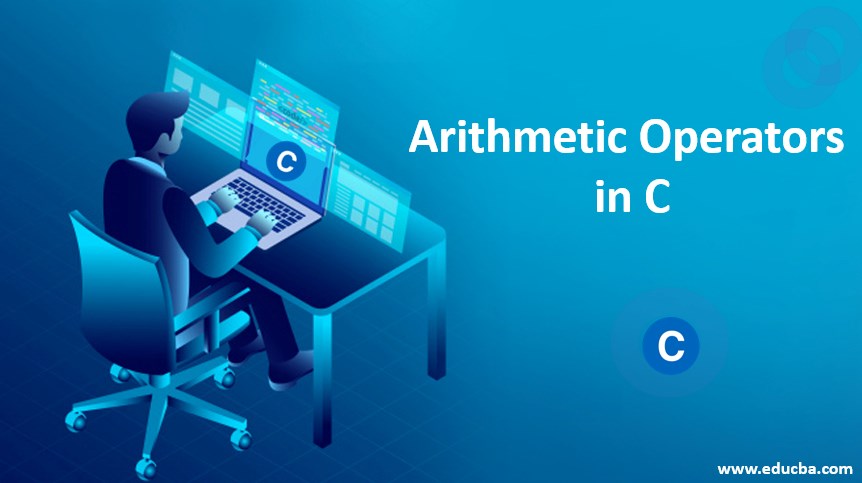Updated March 20, 2023

Introduction to Arithmetic Operators in C
Arithmetic operators are used for performing mathematical operations. C supports these operators to perform various mathematical operations such as addition, subtraction, division, multiplication, etc.
There are various operators in C which are as follows:
- Addition Operator + : This operator is used to add two operands. Suppose P and Q are two operands, this plus operators will add up these two operands. i.e. P + Q.
- Subtraction Operator – : This operator is used to subtract two operands. Suppose P and Q are two operands, then this minus operator will subtract the value of the second operand from the first operand. i.e. P – Q.
- Multiplication Operator * : This operator is used to multiply two operands. Suppose P and Q are two operands then this multiplication operator will multiply P with Q. i.e. P * Q.
- Division Operator / : This operator is used to numerator by the denominator. Suppose P and Q are two operands, this division operator divides the numerator by denominator. i.e. P / Q.
- Modulus Operator % : This operator is used to give the remainder of the division. Suppose P and Q are two operands then this modulus operator first divides the numerator by denominator and gives the remainder. i.e. P % Q.
- Increment Operator ++ : This operator is used to increment the value of the variable by 1. Suppose X is the operand, then this increment operator will add the value of P by 1.
- Decrement Operator — : This operator is used to decrement the value of the variable by 1. Suppose X is the operand, this decrement operator will decrement the value of P by 1.
Examples of Arithmetic Operators in C
The following tutorial is a guide to the examples of arithmetic operators.
Example #1
Program to use Addition (+) operator in C.
Code:
#include<stdio.h>
#include<conio.h>
int main()
{
int P, Q, total;
printf(" Enter the value of P: ");
scanf("%d" ,&P);
printf(" Enter the value of Q: ");
scanf("%d",&Q);
total = P + Q;
printf("%d", total);
return 0;
}Output:

Example #2
Program to use Subtraction (-) operator in C.
Code:
#include<stdio.h>
#include<conio.h>
int main()
{
int P, Q, total;
printf(" Enter the value of P: ");
scanf("%d" , &P);
printf(" Enter the value of Q: ");
scanf("%d", &Q);
total = P - Q;
printf("%d", total);
return 0;
}Output:

Example #3
Program to use multiplication * arithmetic operator in C.
Code:
#include<stdio.h>
#include<conio.h>
int main()
{
int P, Q, total;
printf(" Enter the value of P: ");
scanf("%d", &P);
printf(" Enter the value of Q: ");
scanf("%d", &Q);
total = P * Q;
printf("%d", total);
return 0;Output:

Example #4
Program to use Division/Arithmetic operator in C
Code:
#include<stdio.h>
#include<conio.h>
int main()
{
int P, Q, total;
printf(" Enter the value of P: ");
scanf("%d", &P);
printf(" Enter the value of Q: ");
scanf("%d", &Q);
total = P / Q;
printf("%d", total);
return 0;
}Output:

Example #5
Program to use modulus % arithmetic operator in C.
Code:
#include<stdio.h>
#include<conio.h>
int main()
{
int P, Q, total;
printf(" Enter the value of P: ");
scanf("%d", &P);
printf(" Enter the value of Q: ");
scanf("%d", &Q);
total = P % Q;
printf("%d", total);
return 0;
}Output:

Example #6
Program to use Increment ++ arithmetic operator in C.
Code:
#include<stdio.h>
#include<conio.h>
int main()
{
int P;
printf("Enter the value of P: ");
scanf("%d",&P);
P++;
printf("%d",P);
return 0;
}Output:

Example #7
Program to use Decrement — arithmetic operator in C.
Code:
#include<stdio.h>
#include<conio.h>
int main()
{
int P;
printf("Enter the value of P: ");
scanf("%d",&P);
P--;
printf("%d",P);
return 0;
}Output:

Recommended Articles
This is a guide to Arithmetic Operators in C. Here we discuss the Introduction, different types of arithmetic operators and examples. You may also have a look at the following articles to learn more –


